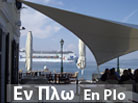 Deutchland Deutchland
Saint Spyridon (Greek Άγιος Σπυρίδων ca. 270–348) is a saint honoured in both the Eastern and Western Christian traditions.
Spyridon was born in Askia in Cyprus. He worked as a shepherd and was known for his great piety. He married and had one daughter, Irene. Upon the death of his wife, Spyridon entered a monastery, and their daughter, a convent.
Spyridon eventually became Bishop of Tremithous, near Paphos and a was a vocal opponent of Arianism. He took part in the First Ecumenical Council of Nicaea (325), where he was instrumental in countering the theological arguments of Arius and his followers. He reportedly converted a pagan philosopher to Christianity by using a potsherd to illustrate how one single entity (a piece of potery) could be composed of three unique entities (fire, water and clay); a metaphor for the Christian doctrine of the Trinity. As soon as Spyridon finished speaking, the shard is said to have miraculously burst into flame, water dripped on the ground, and only dust remained in his hand (other accounts of this event say that it was a brick he held in his hand).
After the council, Saint Spiridon returned to his diocese in Tremithous. He later fell into disfavor during the persecutions of the emperor Maximinus, but died peacefully in old age. His biography was recorded by the hagiographer Simeon Metaphrastes and the church historians, Sozomen and Socrates Scholasticus.
When the Arabs took Cyprus, Spyridon's body was disinterred and taken to Constantinople. The relics were found to be incorrupt, and contained a sprig of basil, the "royal plant," both of which were taken as a sign of divine confirmation of his sanctity.
When, in 1453, Constantinople fell to the Turks, Spyridon's relics were removed again; this time, to the island of Corfu by a Corfiote monk called Kalohairetis (Καλοχαιρέτης), where they remain to this day. The relics are taken in procession every Palm Sunday and on other special occasions, for veneration by the faithful. The relic of his right hand is now located in Rome.
Spyridon is the patron saint of potters (from the purported miracle of the potsherd) and the island of Corfu where he is called: "Αγιος Σπυρίδων ο πολιούχος", "Saint Spyridon, the Keeper of the City" for the miracle of expelling the plague (πανώλη) from the island. It is believed by the faithful that the plague, on its way out of the island, scratched one of the fortification stones of the old citadel (Palaio Frourio) to indicate its fury for being expelled. This scratch is shown to visitors to this day.
St. Spyridon is also believed to have saved the island at the second great siege of Corfu which took place in 1716. At that time the Turkish army and naval force led by the great Sultan Achmet III appeared in Butrinto opposite Corfu. On July 8 the Turkish fleet carrying 33,000 men sailed to Corfu from Butrinto and established a beachhead in Ipsos. The same day the Venetian fleet encountered the Turkish fleet off the channel of Corfu and defeated it in the ensuing naval battle. On July 19 the Turkish army reached the hills of the town and laid siege to the city. After repeated failed attempts and heavy fighting, the Turks were forced to raise the siege which had lasted 22 days. There were also rumours spreading among the Turks that some of their soldiers saw St. Spyridon as a monk threatening them with a lit torch and that helped increase their panic. This victory over the Turks, therefore, was attributed not only to the leadership of Count Schulenburg who commanded the stubborn defence of the island against the Turks but also to the miraculous intervention of St. Spyridon. After the victorious outcome of the battle, Venice honoured Schulenburg and the Corfiotes for successfully defending the island. The great composer Vivaldi was commissioned to write an opera, Juditha triumphans, in celebration of the victory.
Recognizing St. Spyridon's role in the defence of the island, Venice legislated the annual "Litany of St. Spyridon" on August 11 as a commemoration of the event. His feast day is celebrated in the East on the Saturday before Great Lent (known as "Cheesefare Saturday") and December 12. For those Eastern Churches which follow the traditional Julian Calendar, December 12 falls on December 25 of the modern Gregorian Calendar. In the West he is commemorated on December 14.
St. Spyridon is also the patron saint of the Tolstoy family. Andrei Tolstoy (fl. 15th century) chose St. Spyridon as the family's saint and he remains so in both branches to this day. The Grand Prince of Muscovy Basil II (1425-1462) apparently gave a gold cross containing relics of the saint to Andrei. This reliquary survives to this day and is held by the senior member of the Tolstoy family, now Count Nikolai Tolstoy. |












 Corfu Weather live
Corfu Weather live










